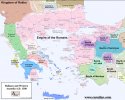There's also the matter of the Genoese and Venetians. Why wouldn't eventually one of them just cut a deal with whatever Turkish power is dominant in Anatolia and officially or unofficially help them to take Constantinople in exchange for protecting their merchant communities and trading rights? Genoa in particular had a lot of enclaves in Anatolia like Phocaea which eventually fell to Turkish capture, and they'd benefit from getting the Turks to clamp down on their pirates. If we're assuming that Karaman or whoever has little chance at creating the same sort of structure the 15th century Ottomans had, they certainly have the incentive to leave the Italian trading posts alone and help them take Constantinople.
Once Constantinople falls, then Europe is open to Turkish attack. It would be necessary to expand the borders deeper into Europe as a buffer because the Bulgarians and Serbs and any Byzantine remnants i.e. Morea will be tenacious about retaking Constantinople while Western Crusaders also see it as a wonderful goal and for the Italian cities it's valuable for their economic prospects. But a lot of different things determine how far they might go into Europe (including affairs with Persia, the Mamluks, etc.), but all of modern Greece and Bulgaria plus perhaps a frontier on the Danube (maybe as far as mid-19th century Ottoman borders even) seems plenty doable given the disunity of that area.
Once Constantinople falls, then Europe is open to Turkish attack. It would be necessary to expand the borders deeper into Europe as a buffer because the Bulgarians and Serbs and any Byzantine remnants i.e. Morea will be tenacious about retaking Constantinople while Western Crusaders also see it as a wonderful goal and for the Italian cities it's valuable for their economic prospects. But a lot of different things determine how far they might go into Europe (including affairs with Persia, the Mamluks, etc.), but all of modern Greece and Bulgaria plus perhaps a frontier on the Danube (maybe as far as mid-19th century Ottoman borders even) seems plenty doable given the disunity of that area.
